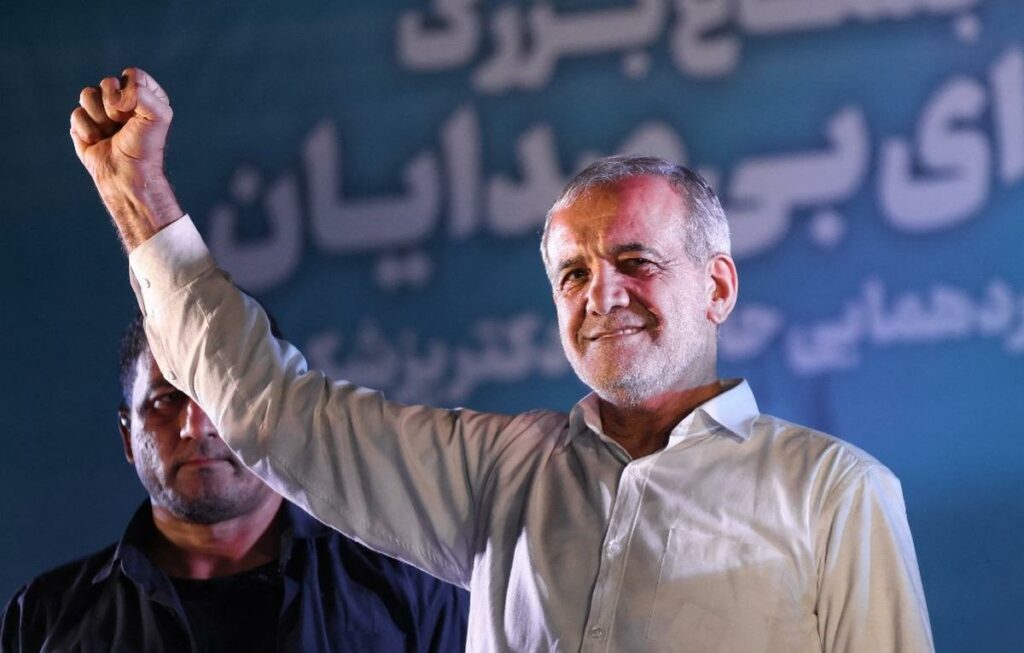
- The reformists are progressive, advocating for easing the extreme Islamic social and religious aspects of Iran and aiming to integrate Iran into the global community, reducing isolation.
- The reformists advocate for engaging in nuclear talks with other countries and believe in the importance of dialogue to address nuclear issues and support reducing nuclear enrichment.
- Although the reformists’ rise may not significantly alter Iran’s perspective on India, it could change the dynamics of Indo-Iranian relations in the context of U.S. influence.
The recently concluded Iranian presidential election marked a significant shift in the country’s political landscape. Reformist candidate Masoud Pezeshkian won the election, defeating conservative Jalili in the second round. This election followed the unfortunate death of the former conservative President of Iran, Ebrahim Raisi, who lost his life in a helicopter crash in May. In response, the Supreme Leader of Iran announced snap elections.
This election is pivotal as it brings the reformist party into power. The reformists are progressive, advocating for easing the extreme Islamic social and religious aspects of Iran. They aim to integrate Iran into the global community, reducing isolation. They believe in modernising Iran’s political and social systems and are strong advocates for women’s rights. Reformists argue that Iran cannot continue under absolute Islamic rule and must provide concessions, modernise, and develop further.
They also emphasize greater economic integration, asserting that Iran cannot remain isolated. They support consultations with other countries, particularly with the West to lift economic sanctions and enable Iran’s growth. Reformists believe that for Iran to prosper, it must be fully incorporated into the global community.
Fundamental differences lie between the reformists and conservatives in Iran, particularly regarding nuclear policy. The conservatives, led by former President Ebrahim Raisi, supported resistance to Western demands. They believed Iran should not engage in nuclear talks, viewing them as an attempt to undermine Iran’s sovereignty and weaken the nation. Conservatives emphasized self-empowerment and independence, resisting external influence and prioritizing national sovereignty.
In contrast, the reformists advocate for engaging in nuclear talks with other countries. They believe in the importance of dialogue to address nuclear issues and support reducing nuclear enrichment. Reformists argue that successful nuclear negotiations can lead to the removal of sanctions, which would, in turn, boost the economy and foster further development.
The rise of the reformists in Iran brings fundamental changes to the country’s strategic direction. Under conservative leadership, particularly during Ebrahim Raisi’s presidency, Iran adopted an inward-looking approach. It formed alliances with countries adversarial to the United States, such as China and Russia, and pursued membership in groups like SCO, clearly positioning itself against Western nations.
The reformists, however, advocate for dialogue and engagement with the United States, signalling a potential shift in foreign policy. This change raises several interesting questions about Iran’s future relationships with its current allies. For instance, Iran’s strategic partnership with Russia, which has involved significant military assistance, could be affected. Additionally, its burgeoning ties with China might also come under scrutiny as the reformists seek to balance relations with the West.
It remains to be seen how Iran will manage these relationships under reformist leadership. Will Iran’s engagement with the United States lead to a re-evaluation of its ties with Russia and China? The reformists’ approach could lead to containment or adjustment in these relationships, significantly impacting Iran’s geopolitical stance and its role on the international stage.
Implications on India
Another important consideration with the reformists coming to power in Iran is the implications for India. Although the reformists’ rise may not significantly alter Iran’s perspective on India, it could change the dynamics of Indo-Iranian relations in the context of U.S. influence.
Under conservative leadership, India faced pressure from Western powers, particularly the United States, to limit its cooperation with Iran like in the Chabahar port deal. However, with the reformists likely to seek consultations and improve relations with the U.S., the economic proximity between India and Iran might face less criticism from the U.S. than it did under the conservative regime.
This shift could lead to smoother economic relations between India and Iran, potentially benefiting both countries as they navigate their international partnerships and economic collaborations.
Aayush Pal is a freelance writer on contemporary geopolitical developments. The views expressed in his work are entirely his own.
